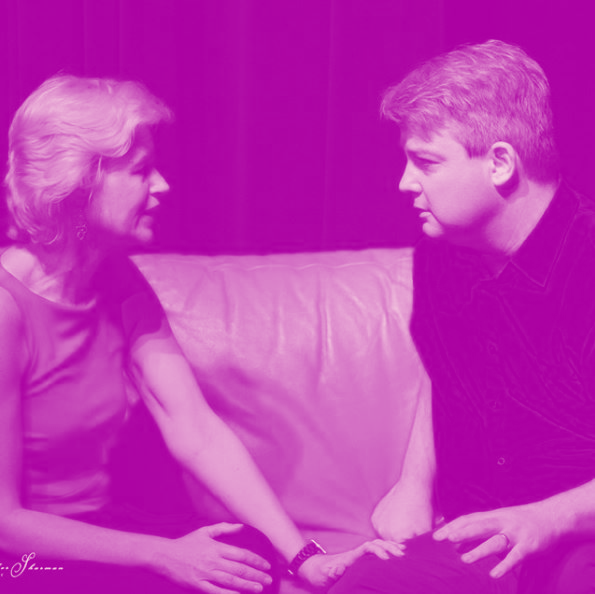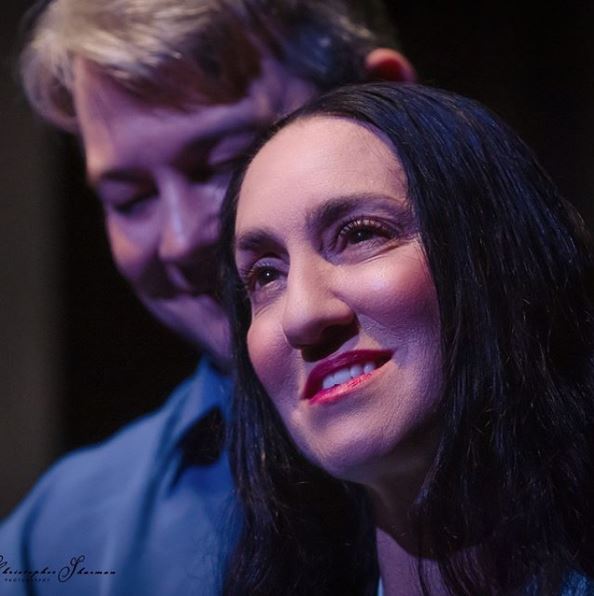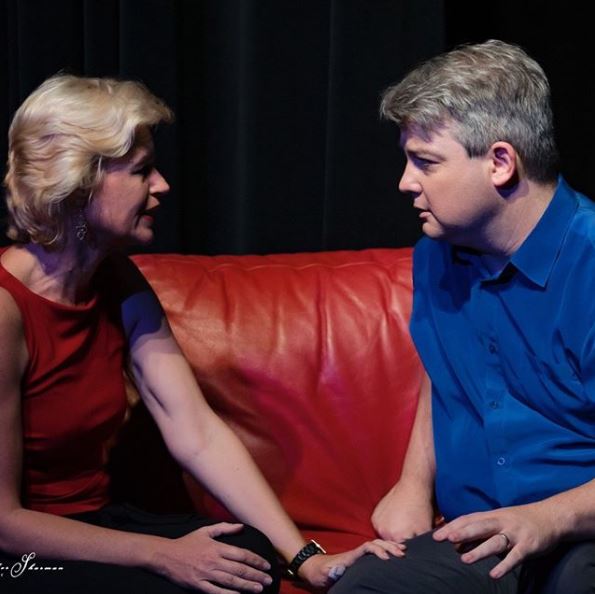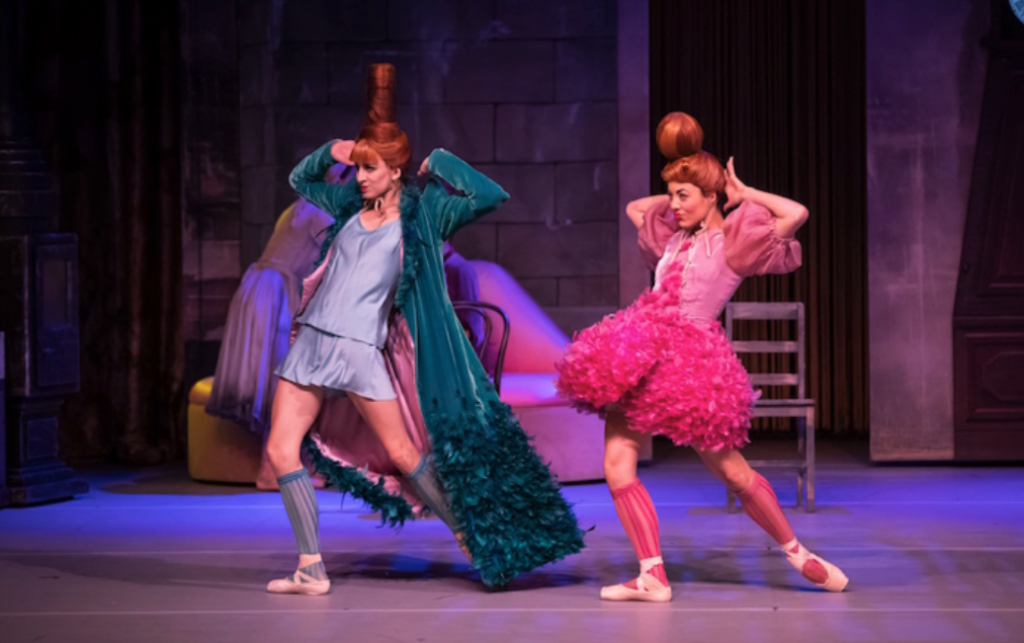
‘Falling From Grace’ // Villanova Players
‘Falling From Grace’ was strong-willed.
Villanova Players successfully opened their 2020 season with ‘Falling from Grace’ at the Ron Hurley Theatre. The award-winning play, directed by Elizabeth Morris, focuses on the friendship between three close friends as they struggle to juggle work, children, husbands, lovers, and a new drug targeted at women suffering from PMS.
Australian playwright Hannie Rayson, known for the award-winning ‘Hotel Sorrento’ (1990), has captivated audiences with this tale of three friends, Suzannah, Maggie and Janet (Brock), who all work together at Metro Magazine. The magazine is preparing to print an article on Dr Miriam Roth, a female doctor who is the head of the medical team testing the drug ZED 400 – created to alleviate the symptoms of PMS. It is discovered that the drug may or may not be responsible for birth defects, and the trio must then make the moral and ethical decision of whether to follow through with publishing the article.
The Ron Hurley Theatre has an impressive array of lighting options and technical effects available. This production utilised a projector and a constructed white wall, which was used to display projections of images and to aid in differentiating settings. Although the projection assisted in cementing the action, the images lacked quality, which ultimately detracted from their effectiveness. Though the idea was there, unfortunately, the execution and use of some props and soundscapes made it difficult to differentiate scenes.
Soundscapes can enhance a production tenfold by fully immersing the audience into the world of the play. Unfortunately, the audio files within ‘Falling From Grace’ were at times too loud and choppy, which was distracting. This was another instance where the concept was strong but the technology behind the execution let the production down. The soundscapes also included popular songs with lyrics, and although no designer was credited, perhaps some simple, quiet ambient music/underscoring would have been better suited.
Designed by Rod Thompson, the lighting used throughout was quite simple, considering the variety of lights available in the theatre. The show is normally presented as a lights-up-lights-down episodic play, however, in Villanova Players’ production, they opted to keep the stage lit for almost the entire show. There were times when this was done very effectively; for instance, Suzannah is seen sitting on the couch in her home re-applying her makeup, while Maggie and Brock are seen talking in the office, Suzannah walks into the office a little later and the scene continues. Transitions like these worked well with Thompsons’ lighting design.
The intimate stage space was scattered with chairs, a couch, and tables, which were effectively used to split the staging into different ‘areas’, thus creating homes, offices, and cafes. The couch, with a wooden countertop behind it, was used in all the scenes set in a home. Pillows on the couch were removed, placed, or flipped around in the show to differentiate each character’s own living area. The Metro Magazine office space, also doubling as a doctor’s office, consisted of two large desks, one shared by Brock and Maggie, while Suzannah had her own private desk. There were two spare chairs left at the back of the stage, that were moved forward and back by the cast members to accommodate one or two extra characters in the scenes. At times, the dragging noise detracted and the show could have benefitted from leaving the chairs off stage and only bringing them on as required, as achieved in the cafe and other scenes.
The costuming was quite detailed and reflected each character successfully. Some highlights included Brock’s comfortable yet work-appropriate maternity clothing, Susannah’s classy and sophisticated look, and Maggie’s fun but still formal attire. The smaller details, such as marital rings for the married characters in the show, added a level of detail that is often missed in the theatre.
Morris adapted and modernised the script to give the show more relevance to the world of today. While this worked and was an innovative approach, at times, it felt a little forced and didn’t maintain consistency throughout the whole script. Concepts like Uber, Amazon Alexa and Menulog were referenced but felt out of place. The script appeared to be manipulated only where things may have been considered out of date in 2020, compared to the 1990s. The dialogue about ‘Alexa’ was only used once, similar to a Menulog bag brought onstage by Tessa, which wasn’t referred to or had reason to be in the scene.
The three leading ladies had great chemistry, with Helen Ekundayo as Suzannah, Alison Clark as Maggie and Crystal Williams as Brock. It was immediately apparent that they were very good friends and the audience felt included in their friendship. Ekundayo was a standout in the trio, with her convincing, considered and authentic portrayal of Suzannah, she inhabited the character through her physicality, presence, and presentation. Clark brought a cheeky and animated Maggie to life on the stage and Williams brought a humorous Brock. Williams’ physicality of Brock was quite entertaining as she waddled across the stage (as Brock is 8 months pregnant), However, her delivery sometimes fell slightly flat, perhaps exploring some more light and shade in her delivery could heighten her emotional performance to match her physicality.
Supporting the trio was Gregg Goriss as Dr Hugh, Garry Condoseres as Michael, Michelle Malakwin as Dr Miriam Roth, Dayna Ekundayo as Tessa and Mary St Ledger as the Nurse. Goriss was a wonderful member of this cast and fit the role of Hugh quite well as a strong, opinionated figure in the story. Condoseres was another standout in this production, matching H. Ekundayo’s commitment to character, and the two had strong chemistry that was a pleasure to watch. Malakwin as Dr Miriam Roth was a voice of reason, feminism, and empowerment in the story, but her messages were sometimes lost as she played primarily to the audience when speaking, instead of to the characters present with her. Ekundayo and Mary St Ledger make minimal appearances on stage, but when they did the audience felt an instant connection with both the characters and their dialogue.
The story of ‘Falling from Grace’ is a wonderful narrative of friendship, feminism and ethical decision. While cohesion of ideas could have been tightened to convey the story’s message, the cast did justice and presented a modernised version.
‘Falling from Grace’ performed until Sunday, 8 March 2020 at The Ron Hurley Theatre, Seven Hills. For more information about upcoming productions, visit Villanova Players’ website.








